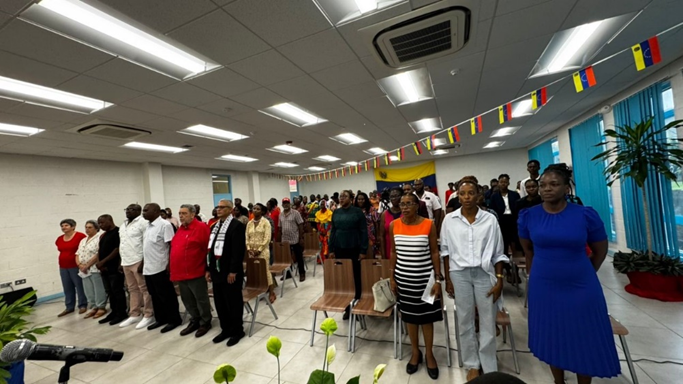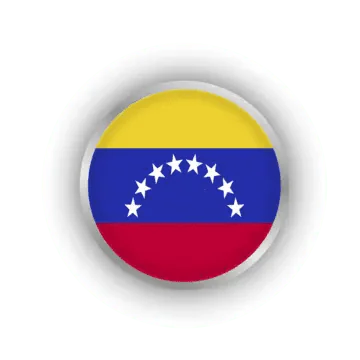Chronicle of a pedagogy of encounter in the key of cultural diplomacy
During the July 5 celebration, when the sun was gently descending on the campus of the University of the West Indies in St. Vincent and the Grenadines, the breeze, the Caribbean rain and the Carnival that was already beginning seemed to solemnly accompany every gesture. In that space, where more than 100 people gathered, including government representatives, politicians, militants of social movements, academics, intellectuals, diplomats, teachers, students, artists and media, more than a commemorative ceremony was opened: a living scene of thought and affection was created, an act that united word, body and memory in defense of a truth that continues to beat: independence is an inheritance made transforming praxis.
The day began with the singing of the hymns “Gloria al Bravo Pueblo” of the Bolivarian Republic of Venezuela, in a very artistic version interpreted by Venezuelan singers, and “Saint Vincent, land so beautiful” of Saint Vincent and the Grenadines. Beyond the musical chords, what could be heard was a historical continuity. The ideas of Francisco de Miranda and Simón Bolívar seemed to float not as echoes of the past, but as current warnings. There was talk of independence, but also of resistance. Of sovereignty, but also of unity. Above all, there was talk of active memory embodied in solidarity: that which is not kept in archives, but expressed in bodies, gestures, languages, ideas.
The act framed in the usual protocol soon gave way to thought. The speech of the head of the Venezuelan diplomatic mission, Francisco Pérez Santana, preceded by the projection of a video that gave an account of the facades in which we commemorate our freedom, the battle of Carabobo and the day of the Bolivarian Army, the practices of violation of human rights by the U.S., the timely and strategic call of President Nicolas Maduro to a summit for peace and the denunciation of our 18 children kidnapped by the U.S. government. The timely and strategic call of President Nicolas Maduro to a summit for peace and the denunciation for our 18 children kidnapped by the Trump administration, was not a simple diplomatic greeting, but a reminder of what July 5 means. Perez made an invitation to understand that the unity of Latin America and the Caribbean is not only a historical dream, but an urgent task in the face of renewed threats of imperialism, extractivism and oblivion. The head of the mission took the opportunity to recall that President Maduro’s call to the summit for Peace is important because it reaffirms the importance of Venezuela in the global scenario, proposes dialogue as an alternative to unilateralism and blockades, exposes the double standards of those who speak of peace while practicing economic war and links peace with integration, development and social justice.
In that voice, Bolivar and Chavez were present, each one, in his time, pointing to the same constellation: the self-determination of the peoples; “The events of July 5, 1811 marked a foundational epistemological rupture. They meant more than a secession from Spanish rule; they constituted the affirmation of a new political subjectivity: Our America as a sovereign actor, animated by the will of its people”, said Perez. The Venezuelan diplomacy raised the need to review the traditional concepts of sovereignty “In the 21st century, sovereignty must be thought beyond the Westphalian notions of territorial control. It must encompass the capacity of a nation to autonomously determine its economic model, conduct its foreign policy and defend the cultural and symbolic practices of its people”, declared Pérez Santana.
The guest historian, Dr. Cleave Scott, professor at UWI-Barbados, continued the weaving with precise words, reminding us that history is not a neutral narrative or a succession of dates: it is a field of dispute, a map of silences and presences. And that, on that map, the Caribbean has not been a periphery, but a center. It has not been a margin, but an intersection of struggles, of languages, of collective dreams. Scott, in a profound appeal, recalled what is so often forgotten: “When Columbus and all those people came, we already knew who we were. They were not discoveries, we already existed, the Caribbean was inhabited by our ancestors”. The phrase, launched with a mixture of humor and profound truth, brought smiles, but also complicit nods. Because in that statement lay an ancient certainty: the identity of this continent did not begin with the chronicles of Europe. It was then that the name of Simón Bolívar appeared with force. “He recognized it. Bolivar understood that unity. That’s why, when he left Venezuela, he went directly to Jamaica. And then directly to Haiti. And there he said clearly: ‘We want to free ourselves from imperialism,’ we must build Gran Colombia.”
Thus, in a matter of minutes, a map of living history was drawn. Jamaica, Haiti, Venezuela, St. Vincent. Places connected not by trade or geography, but by a common struggle for dignity. “And that battle,” the speaker said firmly, “is not yet over. We are still in it.” The intervention was not limited to remembering: he also sensitized those present “If you do not know the history, you will not understand how we will get to the future,” he said. The phrase vibrated among those present as a call, because the new cannot be built from ignorance. Because history is not a dead past: it is a compass for the future.
Then it was the turn of solidarity expressed in the voice of the Prime Minister of St. Vincent and the Grenadines, Ralph Gonsalves, “I don’t have to recite it over and over again: we have an airport. Argyle International Airport was not a promise, but a reality built thanks to solidarity, with an essential contribution from Venezuela and other friendly countries,” was the result of a common commitment to the development of the Caribbean. A living lesson of how the future is built when nations reach out to each other. The world, Gonsalves warned, has entered a stage of profound transformation. The U.S. dollar, which for decades dominated world trade, accounting for 85% of global transactions after Nixon’s turnaround in the 1970s, has now fallen to about 60%. Although still strong, its hegemony is eroding.
“There, again, Venezuela appears. Not because of its past contributions, but because of the injustice that still weighs on its gold held in the Bank of England. Gold that belongs to the Venezuelan people, but which has been blocked by a political decision disguised as legality.” Gonsalves wove two intersecting stories: that of an airport that rose with Venezuelan solidarity, and that of a country that, because of that same solidarity, has been punished by the supposed guardians of the old financial order.
At the meeting in celebration of July 5th, there was also body, rhythm and movement. The dance presentation with drums was a moment of suspension. The language withdrew, and in its place spoke the ancestral memory. Percussion was not only sound: it was earth, it was root, it was communion. There, in the repeated gesture, in the vital synchrony, a form of knowledge was expressed that does not fit in books, but that founds senses. The interpretation of traditional Venezuelan pieces -mixed with international repertoire- was a declaration without discourse: culture is shared. Music did what politics sometimes fails to do: to unite without erasing differences, to unite without homogenizing.
That meeting was also a celebration of learning. Students from the Venezuelan Institute for Culture and Cooperation “Hugo Chávez Frías” took the floor in their new language (Spanish), not as a school exercise, but as a way of taking a stand: learning the language of the other is also opening up to their world, to their cultural codes, to their pains and hopes. In the dialogues staged, in the poems recited, in the songs, it became evident that language is not only a tool, but a way of inhabiting the world. And that each word spoken is a gesture of alliance.
The event progressed with the recognition of those who had completed levels of Spanish language learning. But beyond the certificates, what was being celebrated was a practice of dignity. Because studying in the midst of economic blockades, in contexts of difficulty and asymmetry, is an act of affirmation, “We continue learning, we continue meeting, we continue dreaming of a world where borders are not walls, but crossing points” exclaimed with determination the Academic Coordinator of the Venezuelan Institute for Culture and Cooperation Hugo Chávez Frías.
What took place there was a sharing where history, affection, politics and art were intertwined. A proof that it is possible to build integration from below, from the communities, from the streets, from the classrooms, from the bodies in movement, from the word spoken with one’s own accent. There was talk of Venezuela, yes, but also of the Caribbean, of Latin America, of the Global South. We spoke of peoples who do not give up hope. Of projects that do not give up. Of memories that are not archived because they continue to beat.
This event -local in its geography, but universal in its meaning- was the concrete expression of this proposal. A scene where knowledge, music, bodies, languages and memories were linked. A plural response to a system that insists on excluding, sanctioning and homogenizing. From Saint Vincent and the Grenadines, the world was told that the South is not mute. That it continues to speak, to sing, to learn. That it does not resign itself to being the object of other people’s policies, but demands and builds its right to be the subject of its history.
At the end of the day, there was not an empty auditorium, but a shared resonance, because there it was reaffirmed that independence is not a date, but a daily practice. That sovereignty is not isolation, but the right to decide collectively. That peace is not silence, but the multiplied voice of the peoples who demand justice and their freedom.
Freedom is built collectively, between languages, between peoples, between shared memories, as stated by the Prime Minister of Saint Vincent and the Grenadines, quoting African wisdom: “If you want to go fast, go alone; if you want to go far, go together. And if we go together you will find that we go faster than if you go alone”.
Thus, 214 years after that inaugural gesture in Caracas, history continues to be written. Not on marble, but on bodies. Not in textbooks, but in living classrooms. Not from above, but from below, where the people resist, create, and continue dreaming of the Patria Grande.



